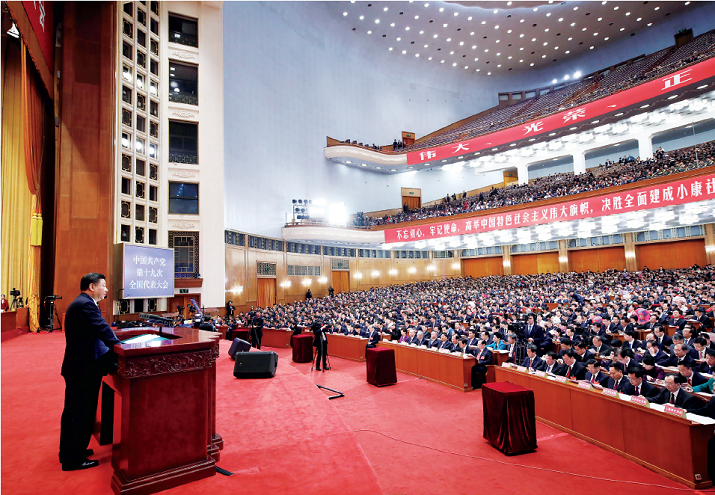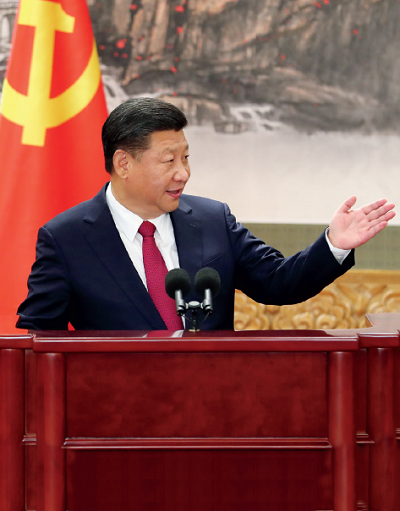|
||||||||||
| Home Nation World Business Opinion Lifestyle ChinAfrica Multimedia Columnists Documents Special Reports |
|
||||||||||
| Home Nation World Business Opinion Lifestyle ChinAfrica Multimedia Columnists Documents Special Reports |
| China |
| Time of Action |
| Communist Party of China outlines its roadmap for development in a new era |
| By Ni Yanshuo and Lan Xinzhen | VOL.9 November 2017 ·2017-10-31 |

Xi Jinping addresses the 19th CPC National Congress on October 18
China once again came under the global spotlight when the new seven-member leadership of the Communist Party of China (CPC) appeared before the press at the Great Hall of the People in Beijing on October 25, the day after the conclusion of the 19th CPC National Congress, held on October 18-24.
"We will work diligently to meet our duty, fulfill our mission and be worthy of people's trust," pledged Xi Jinping, one of the seven members of the Political Bureau Standing Committee of the 19th CPC Central Committee. Xi was reelected the general secretary of the CPC Central Committee at the First Plenary Session of the 19th CPC Central Committee. He then went on to introduce the six other members (see page 20 for more information on the seven members).
According to Xi, the world's second largest economy will continue to deepen reform and open itself wider to the outside world in the next five years. It will strive for sustainable economic growth and prosperity for all, while working with other nations to "build a global community with a shared future" to make "new and greater contributions to the noble cause of peace and development for all humanity."
Xi noted that over the past five years, the CPC has set out a broad agenda. Some tasks have already been completed while others need more work. "This congress has set new goals and new tasks. We must make coordinated efforts to see them through," he added.
New changes
Thanks to the diligent work and firm leadership of the CPC, great changes have taken place in the country in all aspects, especially in the past five years. Facing problems such as a slower economic growth, widening wealth gap and corruption, Xi and the CPC took effective measures such as promoting supply-side structural reform, encouraging an innovation-based economy, launching anti-corruption campaigns and taking a targeted approach to poverty alleviation.
Xi's unparalleled measures paid off. During the period from 2013 to 2016, China's average annual GDP growth reached 7.2 percent, compared to 2.5 percent of global growth in the same period. In addition, the impoverished population dropped from nearly 100 million in 2012 to 43.35 million at the end of 2016, while the Belt and Road Initiative is connecting the world.
In light of the historic changes, there is global expectation of what Xi and the new CPC leadership will bring to China in the coming years. Xi described the next five years as a period of "important junctures and signposts." China has set the goal of completing the building of a moderately prosperous society in all aspects by 2020, just one year before the CPC celebrates its centenary.
In his report to the 19th CPC National Congress on October 18, Xi announced that China had entered a new era of development and spelled out a two-stage plan for the way forward.
In the first stage from 2020 to 2035, China will build on the foundation created by the moderately prosperous society in its pursuit of realizing socialist modernization. In the second stage from 2035 to the middle of the 21st century, China will, building on the premise of having achieved modernization, become a modern socialist country that is prosperous, strong, democratic, culturally advanced, harmonious, and beautiful.
New era thought
Theories come from practice and they, in turn, guide practice. This is a law that has prevailed through the course of development of Chinese society and humanity as a whole.
A main function of the CPC's national congress is to summarize and advance its theory on development. At this year's congress, the Party's new combined theories are defined as the Xi Jinping Thought on Socialism with Chinese Characteristics for a New Era.
Xi's report brings clarity to certain issues, including the overall goal and the plan of developing socialism with Chinese characteristics. More importantly, it specified that the leadership of the CPC is the defining feature of socialism with Chinese characteristics and the greatest strength of the system, calling the Party "the highest force for political leadership."
Xi said the thought should act as a guide to action for all Party members and for all Chinese people to achieve national rejuvenation, and should be adhered to and steadily developed on a long-term basis.
Xian Hui, a delegate to the 19th CPC National Congress and Chairwoman of Ningxia Hui Autonomous Region, sees the thought as a summary of the governance concepts, thoughts and strategies put forward by Xi in the past five years, as well as development of the CPC's guiding ideologies of Marxism-Leninism, Mao Zedong Thought, Deng Xiaoping Theory, the Theory of Three Represents and the Scientific Outlook on Development.
"We should never entertain the idea of taking a breather or halting our steps," Xi told the Chinese nation in the televised address.

Shared future
The Xi Jinping Thought on Socialism with Chinese Characteristics for a New Era is not exclusive to China and can benefit any countries that want to accelerate their own development. In the words of Xi, "The path, the theory, the system, and the culture of socialism with Chinese characteristics have kept developing, blazing a new trail for other developing countries to achieve modernization. It offers a new option for other countries and nations who want to speed up their development while preserving their independence; and it offers Chinese wisdom and a Chinese approach to solving the problems facing mankind."
Over the past few years, Xi has proposed to build a community of shared future for humankind on various international platforms and his ideology has also been incorporated in a UN resolution.
The world is undergoing profound development, transformation and adjustment, but peace and development remain the clarion call. Meanwhile, the trend of global multi-polarity, economic globalization, IT application and cultural diversity are advancing, changes in the global governance system and international order are speeding up, and international forces are becoming more balanced, according to observers.
And yet, experts argue that global economic growth lacks energy, the gap between rich and poor continues to widen, conflicts are commonplace in some regions, and unconventional security threats like terrorism, lack of cybersecurity and climate change continue to spread.
"We call on the people of all countries to work together to build a community with a shared future for humanity, to build an open, inclusive, clean and beautiful world that enjoys lasting peace, universal security and common prosperity," Xi said in the report to the Party congress.
He also pointed out that to make new and greater contributions to humanity is the CPC's abiding mission.
Some people regard China's endeavors, like the Belt and Road Initiative and the Asian Infrastructure Investment Bank, as challenges to the current international order. However, it can be seen from the report that the initiatives are consistent with China's adherence to the fundamental national policy of opening up and its commitment to actively promoting international cooperation in a responsible way.
China resolutely opposes trade protectionism, actively supports the multilateral trading system, and promotes the establishment of free trade areas and of an open and inclusive world economy.
Information from the congress show that China will continue to play its part as a major and responsible country, take an active role in reforming and developing the global governance system, and continue to contribute Chinese wisdom and approach to global governance.
"Frankly speaking, China has eventually found its path to success after bold exploration and it can lend its experience and wisdom to many other countries in this aspect," said Zhang Weiwei, Dean of the China Institute of Shanghai-based Fudan University.
| About Us | Contact Us | Advertise with Us | Subscribe |
| Copyright Beijing Review All rights reserved 京ICP备08005356号-5 京公网安备110102005860号 |